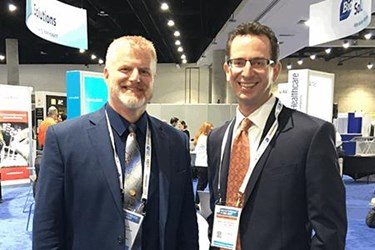Daniel Skovronsky – From Grad Student, To CEO, To Big Pharma

By Rob Wright, Chief Editor, Life Science Leader
Follow Me On Twitter @RfwrightLSL

Daniel Skovronsky, M.D., Ph.D., SVP of clinical and product development at Eli Lilly and Company, is responsible for developing the Lilly pipeline of molecules. Prior to this role he held a very different title — CEO of Avid Radiopharmaceuticals — a company he founded in Philadelphia while still a graduate student at the University of Pennsylvania. During the 2017 BIO International Convention in San Diego, Skovronsky sat down to tell me the complete story of his becoming an entrepreneur. And while I can’t wait for Life Science Leader subscribers to read all about it in our November issue, I wanted to give you a sneak peek via our popular “Beyond The Printed Page” online section of our magazine. Skovronsky’s upcoming article is a must read for anyone who dreams of starting their own biopharmaceutical company. But only those with a current subscription (which you can get here at a reduced rate of right around $4 an issue) will be able to do so. We hope you enjoy this free bonus content, and welcome your feedback once you get the chance to read all about Daniel Skovronsky.
Role Reversal
When Skovronsky started at Lilly he was given a variety of responsibilities. So, not only did he learn more about the business, he learned a lot about the Big Pharma. “One of the reasons I convinced investors that Lilly was the best offer was their history of nurturing the companies they acquired. Now that I am on the other side of this and working for Lilly, this has proven to be true. I just came from the dedication of a new Lilly research site in San Diego.” Lilly’s presence in biotechnology research in San Diego came about via the acquisition of two other companies — Hybritech (1986) and Applied Molecular Evolution (2003). According to Skovronsky, there are still people working at this facility, who, like him, joined Lilly via acquisition many years ago. “We don’t just acquire technologies, but teams, and sometimes facilities, with the goal of building and adding to our capabilities,” he notes.
Because Skovronsky was a founder whose company was acquired by Lilly, he is sometimes placed in the role of talking to potential partners and explaining Lilly’s approach to an acquisition. But that’s not his fulltime job. “Initially I worked for David Ricks on the business side and spent most of my time in Philadelphia,” he shares. “Then Jan Lundberg asked me to take a leadership role on the research side, combining three different research groups — translational medicine, translational science, and diagnostics.” This was a big decision, for at the time he was still living in Philadelphia, and running this unit would require him spending several days a week in Indianapolis. “I like the way things worked out, but I would not recommend it,” he laughs. About two and a half years ago his family was ready to relocate, so he now calls Indianapolis home.
What Else Is Different In His New Role?
“The team doesn’t have to worry about raising money anymore,” Skovronsky shares. “That was a pretty big portion of my job at Avid, as was maintaining relationships with potential investors and pharmaceutical companies that might be acquirers or partners.” As a wholly owned subsidiary of Lilly, Avid gained not only the stability and confidence provided by a Big Pharma, but also longer time horizons. “We can make much longer-term future investments,” he adds. Further, he believes the Avid team is benefitting from him not physically being located in Philadelphia where the company is based. “I think having me out of their way is certainly a good thing,” he shares. “It’s a very competent team, and I don’t believe they need me there for the day-to-day operations.” Another difference is he is now responsible for thousands of employees located all over the world, versus the 120 working in Philadelphia.
He is also no longer burdened by the role of CEO. “Being the CEO, you feel an incredible sense of responsibility,” he admits. “I often thought about what would happen if I made a bad decision that might impact those people who put their trust in me.” This burden was especially heavy during the financial crisis of 2008 to 2009. “Those were dark days,” he states. “All the pharma companies were laying off, and it did not look like people could easily get new jobs.” Skovronsky recalls seeing some venture capitalist doom-and-gloom PowerPoint presentation during that period. “It was a moment when I was not sure if we would make it, so I called my employees together and said we have to stop spending money now. No more free lunches, and look for any way possible to cut our burn rate. No more hiring.” Skovronsky says it was hard, but the team understood the importance of needing to be frugal. But what was really important was even during those dark days, he was able to close another round of financing.
Though no longer a CEO, Skovronsky says even in his current executive-level role he still feels a bit of that responsibility. But the burden is less now that he’s at a stable Big Pharma.
